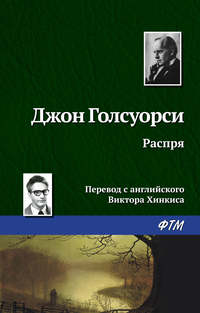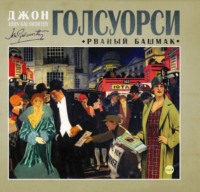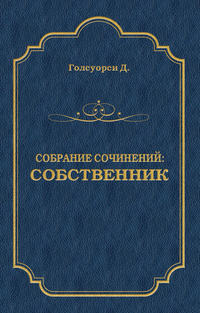 полная версия
полная версияPlays : Third Series
MEGAN. Never was.
WELLWYN. [Turning from the picture.] The question is, Megan: Will you take your wife home? She's a good little soul.
MEGAN. She never let me know it.
[There is a feeble knock on the door.]
WELLWYN. Well, now come. Here she is!
[He points to the door, and stands regarding MEGAN with his friendly smile.]
MEGAN. [With a gleam of responsiveness.] I might, perhaps, to please you, sir.
BERTLEY. [Appropriating the gesture.] Capital, I thought we should get on in time.
MEGAN. Yus.
[WELLWYN opens the door. MRS. MEGAN and FERRAND are revealed. They are about to enter, but catching sight of MEGAN, hesitate.]
BERTLEY. Come in! Come in!
[MRS. MEGAN enters stolidly. FERRAND, following, stands apart with an air of extreme detachment. MEGAN, after a quick glance at them both, remains unmoved. No one has noticed that the door of the model's room has been opened, and that the unsteady figure of old TIMSON is standing there.]
BERTLEY. [A little awkward in the presence of FERRAND—to the MEGANS.] This begins a new chapter. We won't improve the occasion. No need.
[MEGAN, turning towards his wife, makes her a gesture as if to say: "Here! let's get out of this!"]
BENTLEY. Yes, yes, you'll like to get home at once—I know. [He holds up his hand mechanically.]
TIMSON. I forbids the banns.
BERTLEY, [Startled.] Gracious!
TIMSON. [Extremely unsteady.] Just cause and impejiment. There 'e stands. [He points to FERRAND.] The crimson foreigner! The mockin' jay!
WELLWYN. Timson!
TIMSON. You're a gen'leman—I'm aweer o' that but I must speak the truth—[he waves his hand] an' shame the devil!
BERTLEY. Is this the rum—?
TIMSON. [Struck by the word.] I'm a teetotaler.
WELLWYN. Timson, Timson!
TIMSON. Seein' as there's ladies present, I won't be conspicuous. [Moving away, and making for the door, he strikes against the dais, and mounts upon it.] But what I do say, is: He's no better than 'er and she's worse.
BERTLEY. This is distressing.
FERRAND. [Calmly.] On my honour, Monsieur!
[TIMSON growls.]
WELLWYN. Now, now, Timson!
TIMSON. That's all right. You're a gen'leman, an' I'm a gen'leman, but he ain't an' she ain't.
WELLWYN. We shall not believe you.
BERTLEY. No, no; we shall not believe you.
TIMSON. [Heavily.] Very well, you doubts my word. Will it make any difference, Guv'nor, if I speaks the truth?
BERTLEY. No, certainly not—that is—of course, it will.
TIMSON. Well, then, I see 'em plainer than I see [pointing at BERTLEY] the two of you.
WELLWYN. Be quiet, Timson!
BERTLEY. Not even her husband believes you.
MEGAN. [Suddenly.] Don't I!
WELLWYN. Come, Megan, you can see the old fellow's in Paradise.
BERTLEY. Do you credit such a—such an object?
[He points at TIMSON, who seems falling asleep.]
MEGAN. Naow!
[Unseen by anybody, ANN has returned.]
BERTLEY. Well, then, my boy?
MEGAN. I seen 'em meself.
BERTLEY. Gracious! But just now you were will–
MEGAN. [Sardonically.] There wasn't nothing against me honour, then. Now you've took it away between you, cumin' aht with it like this. I don't want no more of 'er, and I'll want a good deal more of 'im; as 'e'll soon find.
[He jerks his chin at FERRAND, turns slowly on his heel, and goes out into the street.]
[There follows a profound silence.]
ANN. What did I say, Daddy? Utter! All three.
[Suddenly alive to her presence, they all turn.]
TIMSON. [Waking up and looking round him.] Well, p'raps I'd better go.
[Assisted by WELLWYN he lurches gingerly off the dais towards the door, which WELLWYN holds open for him.]
TIMSON. [Mechanically.] Where to, sir?
[Receiving no answer he passes out, touching his hat; and the door is closed.]
WELLWYN. Ann!
[ANN goes back whence she came.]
[BERTLEY, steadily regarding MRS. MEGAN, who has put her arm up in front of her face, beckons to FERRAND, and the young man comes gravely forward.]
BERTLEY. Young people, this is very dreadful. [MRS. MEGAN lowers her arm a little, and looks at him over it.] Very sad!
MRS. MEGAN. [Dropping her arm.] Megan's no better than what I am.
BERTLEY. Come, come! Here's your home broken up! [MRS. MEGAN Smiles. Shaking his head gravely.] Surely-surely-you mustn't smile. [MRS. MEGAN becomes tragic.] That's better. Now, what is to be done?
FERRAND. Believe me, Monsieur, I greatly regret.
BERTLEY. I'm glad to hear it.
FERRAND. If I had foreseen this disaster.
BERTLEY. Is that your only reason for regret?
FERRAND. [With a little bow.] Any reason that you wish, Monsieur. I will do my possible.
MRS. MEGAN. I could get an unfurnished room if [she slides her eyes round at WELLWYN] I 'ad the money to furnish it.
BERTLEY. But suppose I can induce your husband to forgive you, and take you back?
MRS. MEGAN. [Shaking her head.] 'E'd 'it me.
BERTLEY. I said to forgive.
MRS. MEGAN. That wouldn't make no difference. [With a flash at BERTLEY.] An' I ain't forgiven him!
BERTLEY. That is sinful.
MRS. MEGAN. I'm a Catholic.
BERTLEY. My good child, what difference does that make?
FERRAND. Monsieur, if I might interpret for her.
[BERTLEY silences him with a gesture.]
MRS. MEGAN. [Sliding her eyes towards WELLWYN.] If I 'ad the money to buy some fresh stock.
BERTLEY. Yes; yes; never mind the money. What I want to find in you both, is repentance.
MRS. MEGAN. [With a flash up at him.] I can't get me livin' off of repentin'.
BERTLEY. Now, now! Never say what you know to be wrong.
FERRAND. Monsieur, her soul is very simple.
BERTLEY. [Severely.] I do not know, sir, that we shall get any great assistance from your views. In fact, one thing is clear to me, she must discontinue your acquaintanceship at once.
FERRAND. Certainly, Monsieur. We have no serious intentions.
BERTLEY. All the more shame to you, then!
FERRAND. Monsieur, I see perfectly your point of view. It is very natural. [He bows and is silent.]
MRS. MEGAN. I don't want'im hurt'cos o' me. Megan'll get his mates to belt him—bein' foreign like he is.
BERTLEY. Yes, never mind that. It's you I'm thinking of.
MRS. MEGAN. I'd sooner they'd hit me.
WELLWYN. [Suddenly.] Well said, my child!
MRS. MEGAN. 'Twasn't his fault.
FERRAND. [Without irony—to WELLWYN.] I cannot accept that Monsieur. The blame—it is all mine.
ANN. [Entering suddenly from the house.] Daddy, they're having an awful–!
[The voices of PROFESSOR CALWAY and SIR THOMAS HOXTON are distinctly heard.]
CALWAY. The question is a much wider one, Sir Thomas.
HOXTON. As wide as you like, you'll never–
[WELLWYN pushes ANN back into the house and closes the door behind her. The voices are still faintly heard arguing on the threshold.]
BERTLEY. Let me go in here a minute, Wellyn. I must finish speaking to her. [He motions MRS. MEGAN towards the model's room.] We can't leave the matter thus.
FERRAND. [Suavely.] Do you desire my company, Monsieur?
[BERTLEY, with a prohibitive gesture of his hand, shepherds the reluctant MRS. MEGAN into the model's room.]
WELLWYN. [Sorrowfully.] You shouldn't have done this, Ferrand. It wasn't the square thing.
FERRAND. [With dignity.] Monsieur, I feel that I am in the wrong. It was stronger than me.
[As he speaks, SIR THOMAS HOXTON and PROFESSOR CALWAY enter from the house. In the dim light, and the full cry of argument, they do not notice the figures at the fire. SIR THOMAS HOXTON leads towards the street door.]
HOXTON. No, Sir, I repeat, if the country once commits itself to your views of reform, it's as good as doomed.
CALWAY. I seem to have heard that before, Sir Thomas. And let me say at once that your hitty-missy cart-load of bricks regime–
HOXTON. Is a deuced sight better, sir, than your grand-motherly methods. What the old fellow wants is a shock! With all this socialistic molly-coddling, you're losing sight of the individual.
CALWAY. [Swiftly.] You, sir, with your "devil take the hindmost," have never even seen him.
[SIR THOMAS HOXTON, throwing back a gesture of disgust, steps out into the night, and falls heavily PROFESSOR CALWAY, hastening to his rescue, falls more heavily still.]
[TIMSON, momentarily roused from slumber on the doorstep, sits up.]
HOXTON. [Struggling to his knees.] Damnation!
CALWAY. [Sitting.] How simultaneous!
[WELLWYN and FERRAND approach hastily.]
FERRAND. [Pointing to TIMSON.] Monsieur, it was true, it seems. They had lost sight of the individual.
[A Policeman has appeared under the street lamp. He picks up HOXTON'S hat.]
CONSTABLE. Anything wrong, sir?
HOXTON. [Recovering his feet.] Wrong? Great Scott! Constable! Why do you let things lie about in the street like this? Look here, Wellyn!
[They all scrutinize TIMSON.]
WELLWYN. It's only the old fellow whose reform you were discussing.
HOXTON. How did he come here?
CONSTABLE. Drunk, sir. [Ascertaining TIMSON to be in the street.] Just off the premises, by good luck. Come along, father.
TIMSON. [Assisted to his feet-drowsily.] Cert'nly, by no means; take my arm.
[They move from the doorway. HOXTON and CALWAY re-enter, and go towards the fire.]
ANN. [Entering from the house.] What's happened?
CALWAY. Might we have a brush?
HOXTON. [Testily.] Let it dry!
[He moves to the fire and stands before it. PROFESSOR CALWAY following stands a little behind him. ANN returning begins to brush the PROFESSOR's sleeve.]
WELLWYN. [Turning from the door, where he has stood looking after the receding TIMSON.] Poor old Timson!
FERRAND. [Softly.] Must be philosopher, Monsieur! They will but run him in a little.
[From the model's room MRS. MEGAN has come out, shepherded by CANON BERTLEY.]
BERTLEY. Let's see, your Christian name is–.
MRS. MEGAN. Guinevere.
BERTLEY. Oh! Ah! Ah! Ann, take Gui—take our little friend into the study a minute: I am going to put her into service. We shall make a new woman of her, yet.
ANN. [Handing CANON BERTLEY the brush, and turning to MRS. MEGAN.] Come on!
[She leads into the house, and MRS. MEGAN follows Stolidly.]
BERTLEY. [Brushing CALWAY'S back.] Have you fallen?
CALWAY. Yes.
BERTLEY. Dear me! How was that?
HOXTON. That old ruffian drunk on the doorstep. Hope they'll give him a sharp dose! These rag-tags!
[He looks round, and his angry eyes light by chance on FERRAND.]
FERRAND. [With his eyes on HOXTON—softly.] Monsieur, something tells me it is time I took the road again.
WELLWYN. [Fumbling out a sovereign.] Take this, then!
FERRAND. [Refusing the coin.] Non, Monsieur. To abuse 'ospitality is not in my character.
BERTLEY. We must not despair of anyone.
HOXTON. Who talked of despairing? Treat him, as I say, and you'll see!
CALWAY. The interest of the State–
HOXTON. The interest of the individual citizen sir–
BERTLEY. Come! A little of both, a little of both!
[They resume their brushing.]
FERRAND. You are now debarrassed of us three, Monsieur. I leave you instead—these sirs. [He points.] 'Au revoir, Monsieur'! [Motioning towards the fire.] 'Appy New Year!
[He slips quietly out. WELLWYN, turning, contemplates the three reformers. They are all now brushing away, scratching each other's backs, and gravely hissing. As he approaches them, they speak with a certain unanimity.]
HOXTON. My theory–!
CALWAY. My theory–!
BERTLEY. My theory–!
[They stop surprised. WELLWYN makes a gesture of discomfort, as they speak again with still more unanimity.]
HOXTON. My–! CALWAY. My–! BERTLEY. My–!
[They stop in greater surprise. The stage is blotted dark.]
Curtain.
ACT III
It is the first of April—a white spring day of gleams and driving showers. The street door of WELLWYN's studio stands wide open, and, past it, in the street, the wind is whirling bits of straw and paper bags. Through the door can be seen the butt end of a stationary furniture van with its flap let down. To this van three humble-men in shirt sleeves and aprons, are carrying out the contents of the studio. The hissing samovar, the tea-pot, the sugar, and the nearly empty decanter of rum stand on the low round table in the fast-being-gutted room. WELLWYN in his ulster and soft hat, is squatting on the little stool in front of the blazing fire, staring into it, and smoking a hand-made cigarette. He has a moulting air. Behind him the humble-men pass, embracing busts and other articles of vertu.
CHIEF H'MAN. [Stopping, and standing in the attitude of expectation.] We've about pinched this little lot, sir. Shall we take the—reservoir?
[He indicates the samovar.]
WELLWYN. Ah! [Abstractedly feeling in his pockets, and finding coins.] Thanks—thanks—heavy work, I'm afraid.
H'MAN. [Receiving the coins—a little surprised and a good deal pleased.] Thank'ee, sir. Much obliged, I'm sure. We'll 'ave to come back for this. [He gives the dais a vigorous push with his foot.] Not a fixture, as I understand. Perhaps you'd like us to leave these 'ere for a bit. [He indicates the tea things.]
WELLWYN. Ah! do.
[The humble-men go out. There is the sound of horses being started, and the butt end of the van disappears. WELLWYN stays on his stool, smoking and brooding over the fare. The open doorway is darkened by a figure. CANON BERTLEY is standing there.]
BERTLEY. WELLWYN! [WELLWYN turns and rises.] It's ages since I saw you. No idea you were moving. This is very dreadful.
WELLWYN. Yes, Ann found this—too exposed. That tall house in Flight Street—we're going there. Seventh floor.
BERTLEY. Lift?
[WELLWYN shakes his head.]
BERTLEY. Dear me! No lift? Fine view, no doubt. [WELLWYN nods.] You'll be greatly missed.
WELLWYN. So Ann thinks. Vicar, what's become of that little flower-seller I was painting at Christmas? You took her into service.
BERTLEY. Not we—exactly! Some dear friends of ours. Painful subject!
WELLWYN. Oh!
BERTLEY. Yes. She got the footman into trouble.
WELLWYN. Did she, now?
BERTLEY. Disappointing. I consulted with CALWAY, and he advised me to try a certain institution. We got her safely in—excellent place; but, d'you know, she broke out three weeks ago. And since— I've heard [he holds his hands up] hopeless, I'm afraid—quite!
WELLWYN. I thought I saw her last night. You can't tell me her address, I suppose?
BERTLEY. [Shaking his head.] The husband too has quite passed out of my ken. He betted on horses, you remember. I'm sometimes tempted to believe there's nothing for some of these poor folk but to pray for death.
[ANN has entered from the house. Her hair hangs from under a knitted cap. She wears a white wool jersey, and a loose silk scarf.]
BERTLEY. Ah! Ann. I was telling your father of that poor little Mrs. Megan.
ANN. Is she dead?
BERTLEY. Worse I fear. By the way—what became of her accomplice?
ANN. We haven't seen him since. [She looks searchingly at WELLWYN.] At least—have you—Daddy?
WELLWYN. [Rather hurt.] No, my dear; I have not.
BERTLEY. And the—old gentleman who drank the rum?
ANN. He got fourteen days. It was the fifth time.
BERTLEY. Dear me!
ANN. When he came out he got more drunk than ever. Rather a score for Professor Calway, wasn't it?
BERTLEY. I remember. He and Sir Thomas took a kindly interest in the old fellow.
ANN. Yes, they fell over him. The Professor got him into an Institution.
BERTLEY. Indeed!
ANN. He was perfectly sober all the time he was there.
WELLWYN. My dear, they only allow them milk.
ANN. Well, anyway, he was reformed.
WELLWYN. Ye-yes!
ANN. [Terribly.] Daddy! You've been seeing him!
WELLWYN. [With dignity.] My dear, I have not.
ANN. How do you know, then?
WELLWYN. Came across Sir Thomas on the Embankment yesterday; told me old Timso—had been had up again for sitting down in front of a brewer's dray.
ANN. Why?
WELLWYN. Well, you see, as soon as he came out of the what d'you call 'em, he got drunk for a week, and it left him in low spirits.
BERTLEY. Do you mean he deliberately sat down, with the intention—of—er?
WELLWYN. Said he was tired of life, but they didn't believe him.
ANN. Rather a score for Sir Thomas! I suppose he'd told the Professor? What did he say?
WELLWYN. Well, the Professor said [with a quick glance at BERTLEY] he felt there was nothing for some of these poor devils but a lethal chamber.
BERTLEY. [Shocked.] Did he really!
[He has not yet caught WELLWYN' s glance.]
WELLWYN. And Sir Thomas agreed. Historic occasion. And you, Vicar H'm!
[BERTLEY winces.]
ANN. [To herself.] Well, there isn't.
BERTLEY. And yet! Some good in the old fellow, no doubt, if one could put one's finger on it. [Preparing to go.] You'll let us know, then, when you're settled. What was the address? [WELLWYN takes out and hands him a card.] Ah! yes. Good-bye, Ann. Good-bye, Wellyn. [The wind blows his hat along the street.] What a wind! [He goes, pursuing.]
ANN. [Who has eyed the card askance.] Daddy, have you told those other two where we're going?
WELLWYN. Which other two, my dear?
ANN. The Professor and Sir Thomas.
WELLWYN. Well, Ann, naturally I–
ANN. [Jumping on to the dais with disgust.] Oh, dear! When I'm trying to get you away from all this atmosphere. I don't so much mind the Vicar knowing, because he's got a weak heart–
[She jumps off again. ]
WELLWYN. [To himself.] Seventh floor! I felt there was something.
ANN. [Preparing to go.] I'm going round now. But you must stay here till the van comes back. And don't forget you tipped the men after the first load.
WELLWYN. Oh! Yes, yes. [Uneasily.] Good sorts they look, those fellows!
ANN. [Scrutinising him.] What have you done?
WELLWYN. Nothing, my dear, really–!
ANN. What?
WELLWYN. I—I rather think I may have tipped them twice.
ANN. [Drily.] Daddy! If it is the first of April, it's not necessary to make a fool of oneself. That's the last time you ever do these ridiculous things. [WELLWYN eyes her askance.] I'm going to see that you spend your money on yourself. You needn't look at me like that! I mean to. As soon as I've got you away from here, and all—these–
WELLWYN. Don't rub it in, Ann!
ANN. [Giving him a sudden hug—then going to the door—with a sort of triumph.] Deeds, not words, Daddy!
[She goes out, and the wind catching her scarf blows it out beneath her firm young chin. WELLWYN returning to the fire, stands brooding, and gazing at his extinct cigarette.]
WELLWYN. [To himself.] Bad lot—low type! No method! No theory!
[In the open doorway appear FERRAND and MRS. MEGAN. They stand, unseen, looking at him. FERRAND is more ragged, if possible, than on Christmas Eve. His chin and cheeks are clothed in a reddish golden beard. MRS. MEGAN's dress is not so woe-begone, but her face is white, her eyes dark-circled. They whisper. She slips back into the shadow of the doorway. WELLWYN turns at the sound, and stares at FERRAND in amazement.]
FERRAND. [Advancing.] Enchanted to see you, Monsieur. [He looks round the empty room.] You are leaving?
WELLWYN. [Nodding—then taking the young man's hand.] How goes it?
FERRAND. [Displaying himself, simply.] As you see, Monsieur. I have done of my best. It still flies from me.
WELLWYN. [Sadly—as if against his will.] Ferrand, it will always fly.
[The young foreigner shivers suddenly from head to foot; then controls himself with a great effort.]
FERRAND. Don't say that, Monsieur! It is too much the echo of my heart.
WELLWYN. Forgive me! I didn't mean to pain you.
FERRAND. [Drawing nearer the fire.] That old cabby, Monsieur, you remember—they tell me, he nearly succeeded to gain happiness the other day.
[WELLWYN nods.]
FERRAND. And those Sirs, so interested in him, with their theories? He has worn them out? [WELLWYN nods.] That goes without saying. And now they wish for him the lethal chamber.
WELLWYN. [Startled.] How did you know that?
[There is silence.]
FERRAND. [Staring into the fire.] Monsieur, while I was on the road this time I fell ill of a fever. It seemed to me in my illness that I saw the truth—how I was wasting in this world—I would never be good for any one—nor any one for me—all would go by, and I never of it—fame, and fortune, and peace, even the necessities of life, ever mocking me.
[He draws closer to the fire, spreading his fingers to the flame. And while he is speaking, through the doorway MRS. MEGAN creeps in to listen.]
FERRAND. [Speaking on into the fire.] And I saw, Monsieur, so plain, that I should be vagabond all my days, and my days short, I dying in the end the death of a dog. I saw it all in my fever— clear as that flame—there was nothing for us others, but the herb of death. [WELLWYN takes his arm and presses it.] And so, Monsieur, I wished to die. I told no one of my fever. I lay out on the ground—it was verree cold. But they would not let me die on the roads of their parishes—they took me to an Institution, Monsieur, I looked in their eyes while I lay there, and I saw more clear than the blue heaven that they thought it best that I should die, although they would not let me. Then Monsieur, naturally my spirit rose, and I said: "So much the worse for you. I will live a little more." One is made like that! Life is sweet, Monsieur.
WELLWYN. Yes, Ferrand; Life is sweet.
FERRAND. That little girl you had here, Monsieur [WELLWYN nods.] in her too there is something of wild-savage. She must have joy of life. I have seen her since I came back. She has embraced the life of joy. It is not quite the same thing. [He lowers his voice.] She is lost, Monsieur, as a stone that sinks in water. I can see, if she cannot. [As WELLWYN makes a movement of distress.] Oh! I am not to blame for that, Monsieur. It had well begun before I knew her.
WELLWYN. Yes, yes—I was afraid of it, at the time.
[MRS. MEGAN turns silently, and slips away.]
FEERRAND. I do my best for her, Monsieur, but look at me! Besides, I am not good for her—it is not good for simple souls to be with those who see things clear. For the great part of mankind, to see anything—is fatal.
WELLWYN. Even for you, it seems.
FERRAND. No, Monsieur. To be so near to death has done me good; I shall not lack courage any more till the wind blows on my grave. Since I saw you, Monsieur, I have been in three Institutions. They are palaces. One may eat upon the floor—though it is true—for Kings—they eat too much of skilly there. One little thing they lack—those palaces. It is understanding of the 'uman heart. In them tame birds pluck wild birds naked.
WELLWYN. They mean well.
FERRAND. Ah! Monsieur, I am loafer, waster—what you like—for all that [bitterly] poverty is my only crime. If I were rich, should I not be simply veree original, 'ighly respected, with soul above commerce, travelling to see the world? And that young girl, would she not be "that charming ladee," "veree chic, you know!" And the old Tims—good old-fashioned gentleman—drinking his liquor well. Eh! bien—what are we now? Dark beasts, despised by all. That is life, Monsieur. [He stares into the fire.]
WELLWYN. We're our own enemies, Ferrand. I can afford it—you can't. Quite true!
FERRAND. [Earnestly.] Monsieur, do you know this? You are the sole being that can do us good—we hopeless ones.
WELLWYN. [Shaking his head.] Not a bit of it; I'm hopeless too.
FERRAND. [Eagerly.] Monsieur, it is just that. You understand. When we are with you we feel something—here—[he touches his heart.] If I had one prayer to make, it would be, Good God, give me to understand! Those sirs, with their theories, they can clean our skins and chain our 'abits—that soothes for them the aesthetic sense; it gives them too their good little importance. But our spirits they cannot touch, for they nevare understand. Without that, Monsieur, all is dry as a parched skin of orange.
WELLWYN. Don't be so bitter. Think of all the work they do!
FERRAND. Monsieur, of their industry I say nothing. They do a good work while they attend with their theories to the sick and the tame old, and the good unfortunate deserving. Above all to the little children. But, Monsieur, when all is done, there are always us hopeless ones. What can they do with me, Monsieur, with that girl, or with that old man? Ah! Monsieur, we, too, 'ave our qualities, we others—it wants you courage to undertake a career like mine, or like that young girl's. We wild ones—we know a thousand times more of life than ever will those sirs. They waste their time trying to make rooks white. Be kind to us if you will, or let us alone like Mees Ann, but do not try to change our skins. Leave us to live, or leave us to die when we like in the free air. If you do not wish of us, you have but to shut your pockets and—your doors—we shall die the faster.









